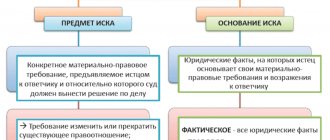Read on our website about how issues with deregistration of children are resolved if they are or are not owners, what documents need to be drawn up to remove minors from registration at the place of residence, and also about whether it is possible to deregister a child when selling an apartment.
Who can't be discharged?
Can an apartment owner sign out a registered relative? It is impossible to deregister relatives from a privatized apartment if at the time of the procedure for changing the status of the living space from municipal to privatized, they officially lived with you (Article 31 of the Housing Code of the Russian Federation). You will find more information about the nuances of extracting from a privatized apartment here.
How to expel a husband (or wife) from an apartment without his consent if you are the owner? When living in a municipal apartment of former spouses , one of them, who is the tenant, will not be able to discharge the other without the latter’s consent, if the unwanted tenant does not systematically disturb the peace of other persons living in the same living space, neighbors in the house (Article 71 of the Housing Code of the Russian Federation). We talk in detail about the nuances and conditions of forced expulsion from municipal housing here.
Can a mother expel her daughter from the apartment without her (or her son’s) consent if, for example, they do not pay rent? The lack of financial support in matters of paying for utilities and maintaining housing in proper technical condition is not a factor that provides the tenant with the right to discharge a negligent tenant.
You cannot discharge a minor:
- from the privatized housing of one of the parents to a living space with a smaller square footage;
- from housing in which part of the area is legally assigned to the child.
We talk about the conditions under which and how minors are discharged in this article, and here you will find out how a homeowner can do this.
What does registration of a citizen affect?
Registration in a specific housing gives a number of rights. Namely:
- Live in an apartment;
- Use the property located in the apartment and the common property of all residents of the house;
- Register as an individual entrepreneur;
- Issue a taxpayer number and pension certificate;
- Arrange benefits;
- Send your child to school or other educational institution;
- Apply for a job;
- Register your minor children and other relatives in this apartment (house);
- Give consent for other people to register at this address.
Let's write it out!
Parents of husband or wife
Can the parent of the ex-spouse be expelled from the apartment? without any problems all the relatives who have become ex-relatives on the basis of your divorce from their son or daughter, only in the case when you all lived together in the premises that you personally purchased before your official marriage.
Brother or sister
Nuances of the procedure:
- When the rights to an apartment are transferred as a result of automatic inheritance, the remaining co-owners cannot be written out of it.
- If a brother/sister was not included in the list of inheritors of the apartment due to the terms of the will, and after the death of the testator, you decided to write out the blood relatives who lived in it with the former owner, then they will most likely want to protest the results of the will and go to court .
- A brother/sister actually living in another living space may be discharged based on a court decision that has received from the initiator of the discharge procedure:
- facts confirming that the person lives in another place;
- document stating that a relative is listed as missing.
child
Can a mother remove her son from the apartment without his consent? Without any problems, you can discharge a capable child:
- a minor living with another parent/relative/guardian who agrees to register the child in their living space - Article 20 of the Civil Code of the Russian Federation (we tell you here whether it is possible to discharge and register a child in the living space of one of the parents without his consent);
- has reached the age of majority, if he has a place to live, or he actually lives with another parent/relative.
People often ask, for example, how to remove grandchildren from an apartment? We answer: if the child has nowhere to live except in your apartment , then the situation can only be changed by purchasing separate housing for the child and his guardian - his own mother/father, or another person who has received the right to guardianship.
When discharging your child, do not try to cheat. If the party representing the interests of the child contacts the guardianship authorities and claims that the rights of a minor have been violated, then any transaction, incl. and purchase and sale may be cancelled.
Grandmother or grandfather
to discharge an elderly relative from an apartment if the grandmother/grandfather is registered in the apartment of another relative or in specially purchased housing.
They will not discharge you if the relative is elderly, dependent on you, or recognized by the court as a person unable to provide themselves with housing and income.
Without agreement
discharge your spouse’s parents without their consent provided that:
- divorce from their son/daughter and their living in an apartment purchased by you before marriage;
- that they are missing.
When a mother and child are discharged, the consent of the minor is not taken into account. Documents provided by a person who has the right to protect the interests of the child are taken into account.
to discharge a grandfather or grandmother , as well as an elderly father or mother, from an apartment if they are incapacitated persons, require financial support, or are people with limited physical abilities.
How to discharge a person from an apartment who does not live in it, for example, an ex-spouse - husband or wife? If a relative does not live, but is listed as registered , go to court, presenting evidence of the fact that the relative is only listed as registered.
Legal rules about extracts
Discharge of a close relative, as well as one’s own adult child, from an apartment is regulated by the Civil and Family Code of the Russian Federation. Therefore, the possibilities of the home owner are limited by legal acts. The state protects the interests of children that are associated with their roof over their heads.
Guardianship of the child is carried out by the prosecutor's office, guardianship and judicial authorities. Until the age of 18, registration at the place of residence and discharge from it are carried out only jointly with the parents or persons responsible for raising the teenager. However, according to article number 292 of the Civil Code, the transfer of ownership of the premises to the new owner also entails the termination of the authority of residence to other family members.
The mentioned paragraph of the code stipulates the need for the consent of the guardianship council to alienate part of the housing if there is a minor without guardianship in it.
Procedure
Algorithm of actions for discharge of a relative, in case he agrees to the procedure :
- On a certain day, you visit the passport office together with a relative, having prepared a package of documents - a house register, passports (we talked about which authorities are involved in the discharge procedure here).
- Fill out forms for extract/registration at a different address.
- Submit your documents for verification.
- Waiting for a date to be set when you can pick up the documents.
Application for registration at the place of residence form and sample.
Application for deregistration at the place of residence, form and sample of completion.
Algorithm for discharging a relative without his consent :
- You contact the court, where they issue a list of documents required to be provided.
- You collect a package of papers.
- You are waiting for the court's decision.
Algorithm for expelling a rowdy relative from a municipal apartment (Article 91 of the Housing Code of the Russian Federation):
- Systematically write statements of complaint to the municipality about the antisocial behavior of a relative, make a copy of the document, and give the original to the addressee.
- Systematically calls representatives of the law to calm the violent one, after which you make a copy of the document confirming the arrival of the police.
- You go to court with the above set of documents.
Deregistration at the place of residence through State Services
To receive a service through the “State Services” portal, you must be registered on this site and complete the following steps:
- go to the State Services website;
- click on the “Registration at your place of residence” section;
- select the required service:
- registration of a citizen at the place of residence;
- registration of a citizen at the place of residence;
- deregistration at the place of residence;
- deregistration of a citizen at the place of residence;
- fill out an application electronically;
- send an application;
- wait for the results of its verification;
- At the appointed time, visit the department of the Main Department of Migration Affairs of the Ministry of Internal Affairs and obtain documents.
Collecting documents
Required documents:
- Passports/birth certificates of the person issuing and the person being issued, respectively.
- Title papers for the apartment (certificate of donation, inheritance, deed of sale and purchase).
- Statement of claim.
- A duplicate of a certificate of family composition.
- Home Book.
- Personal account for living space.
- Certificate of recognition of the person being discharged as missing (depending on the situation).
- A package of papers confirming the antisocial behavior of the person being discharged (depending on the situation).
- A hand-drawn act with the signatures of neighboring residents, their contact details, and confirmation of the fact of antisocial behavior or non-residence of the person they want to evict.
We have provided a list of documents that may be required for independent discharge or in order to discharge another person in this publication.
Making a statement
When drawing up a statement of claim, indicate:
- name of the judicial institution;
- Full name of the plaintiff, contact details;
- Full name of the defendant, contact details (if possible);
- data of an official confirming the existence of grounds for discharge - for example, OUFMS.
The text of the application indicates the reason why they are asking to discharge the tenant and lists the laws of the Russian Federation on the basis of which the court can satisfy the claim. Be sure to briefly formulate your request for an extract.
List the attached documents. At the end they indicate their last name, put the date, and sign.
We talk in more detail about the rules for drawing up statements of claim for forced discharge here.
Going to court
The answer to the question: how to expel my son from an apartment without his consent, if I am the owner, will be: “Go to court!” This always happens , except in cases where the extract is carried out with mutual consent of the parties.
It is very difficult to discharge a person against his will . Factors such as retirement age, poor health, minority, lack of stable sufficient income may be accepted by the court as not giving the right to remove a person from a certain living space.
We talked about how forced deportation occurs in court here.
For some, such a court decision may mean that unbearable living conditions will continue, but for others it will be a chance to maintain decent living conditions in a situation where close relatives turned out to be their worst enemies.
Eviction of the defendant
The eviction of the defendant, even in the case of such a court decision, occurs within a certain period. A citizen who is evicted by court may declare that he has no other housing. In this case, the court will make a decision to preserve his registration for a certain period. Usually this period is from three months to one year. If the court did not make such a decision due to the defendant’s absence at the hearing, then he may file a counterclaim. And based on this application, he will most likely receive a deferment of eviction.









